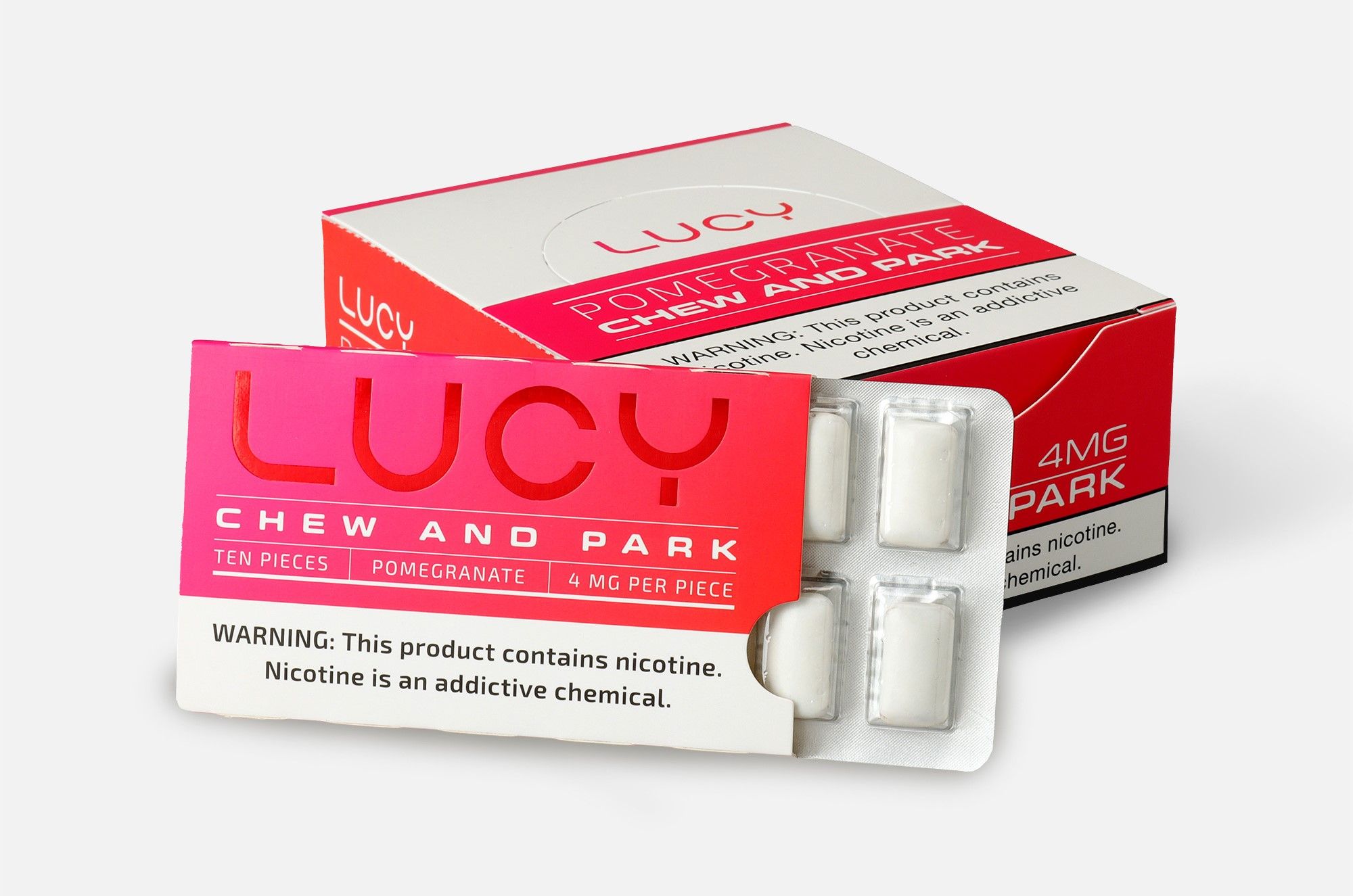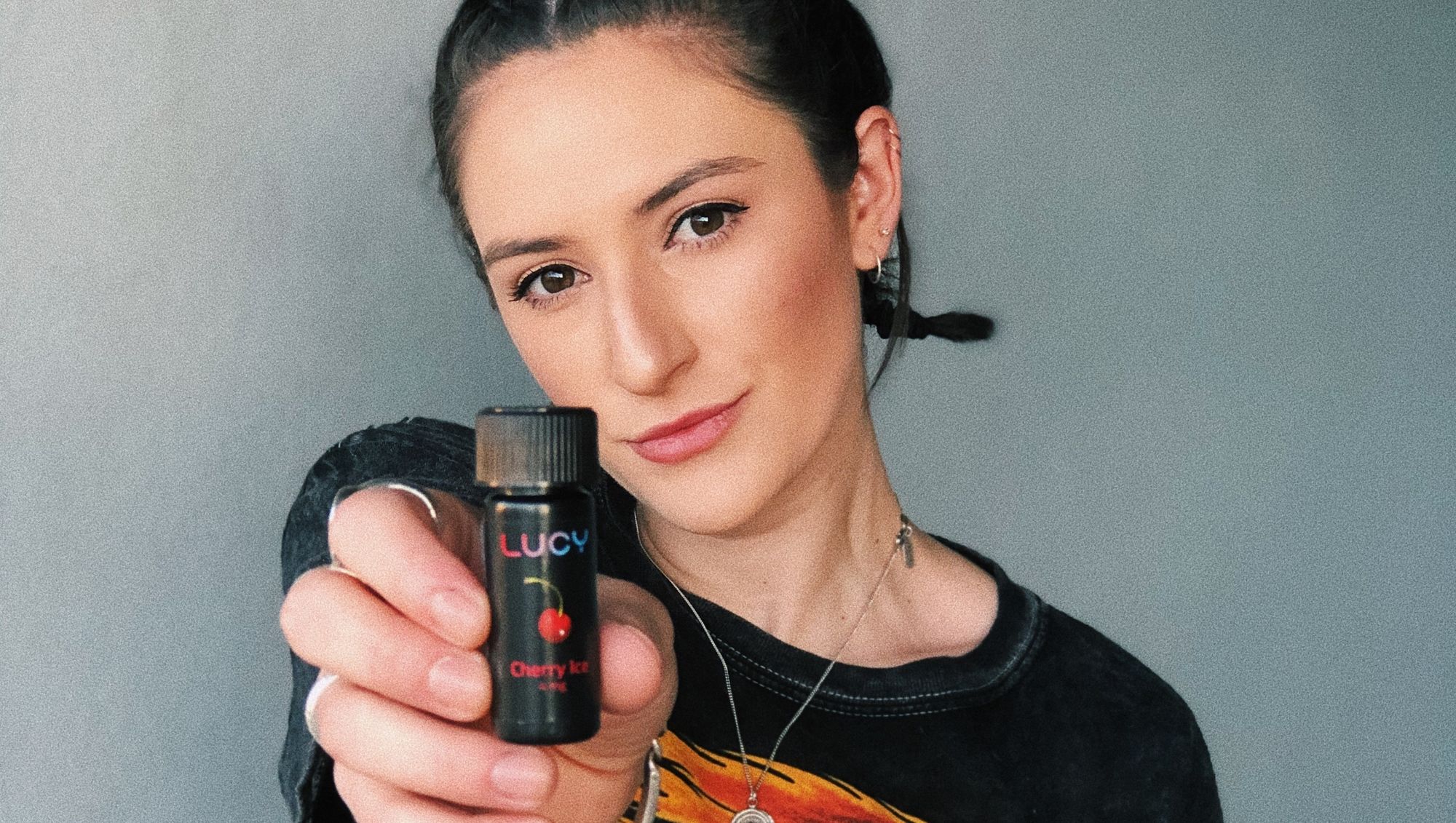If you’ve been thinking about cutting back on cigarettes, you’ve seen endless options available on drugstore counters and from friends or social media ads.
From switching to e-cigarettes (spoiler: don’t do this), to trying nicotine gum or lozenges, nicotine patches, hypnosis, or just quitting cold turkey.
Should you be concerned about nicotine gum side effects? Are they worth fear and anxiety?
Nicotine gum is one of the most popular options for cutting back on cigarettes from your daily life and has been proven to be safe and effective.

What is nicotine gum?
Nicotine gum is a product that can help you cut back on or eliminate cigarettes from your day-to-day life. Each piece of gum contains between two and four milligrams of nicotine - about a third to a sixth of the amount of nicotine in a typical cigarette).
Unlike regular gum, which you chew until it loses its flavor, you both chew and suck on nicotine gum to most effectively release the nicotine into your body. With LUCY’s chew & park, you chew the gum for 10 to 15 seconds, and then position it between your tongue and your cheek, repeating the process until you feel the desired intensity of nicotine release. You do this over the course of a day whenever you start to feel withdrawal symptoms.
The idea is that if used correctly, over time, you’ll experience fewer cravings - so first, you’ll require fewer pieces of nicotine gum over the course of the day, and eventually, you’ll no longer need the nicotine release. Most manufacturers advertise that with nicotine gum, the smoking cessation process should take about 12 weeks, with the maximum being six months.
Nicotine gum has several benefits: while the gum does contain nicotine, it doesn’t contain any of the other dangerous chemicals found in cigarettes, such as formaldehyde, lead, arsenic, and ammonia. You can also use nicotine gum on a schedule or as cravings strike, allowing you to control for yourself how much nicotine you’re consuming over the course of a day. In addition, nicotine gum is available over the counter, is relatively affordable compared to other smoking cessation tools.
We wanted to create a product that was useful, inconspicuous, and not cause you to feel embarrassed. Rather than having to stop what you’re doing in the middle of the workday or while spending time with your friends, only to get up, go outside, and light up a cigarette, you can simply pop a piece of gum without missing a beat. And of course, it doesn’t smell horrible!

What are the side effects of nicotine gum?
As with any product that contains a controlled substance, you can experience side effects from using nicotine gum. Typical side effects may include hiccups, nausea, mouth ulcers, headaches, or dizziness. More serious side effects may include diarrhea, rash, irregular heartbeat, vomiting, or trouble breathing. If you experience any of these side effects, you should stop using nicotine gum immediately and consult your medical provider.
There are, however, some situations where nicotine gum isn’t recommended as a way to cut back on cigarettes. Like with any controlled substance, it’s a good idea to consult your doctor before starting to use nicotine gum to make sure you don’t have any personal health factors that could increase your risk of experiencing side effects or negative outcomes.
For example, the Food and Drug Administration does not recommend nicotine gum for people who are pregnant or breastfeeding, who are under the age of 18, or who smoke less than ten cigarettes per day. The FDA also recommends consulting your healthcare provider if you have diabetes, asthma, or stomach ulcers; have had a recent heart attack; have high blood pressure that is not controlled with medicine; have a history of irregular heartbeat; are on medication for anxiety or depression; or have been prescribed medication to help you quit smoking.
Nicotine is addictive (it’s the ingredient in cigarettes that makes you addicted to all the other toxic ingredients); but, the amount of nicotine in gum or lozenge is much less than that of a cigarette.
Research has shown that it’s extremely rare to become addicted to nicotine gum. And without the other dangerous chemicals, exposure to nicotine alone is far less hazardous than smoking cigarettes. Some studies have even shown that in isolation, nicotine is no more harmful than caffeine.
One thing to keep in mind is that nicotine gum won’t help you resolve any of the mental or psychological factors that might have driven you to smoke in the first place. Many people start smoking to cope with post-traumatic stress or the challenges of everyday life. It can be helpful to seek out additional professional support - through a medical professional or licensed counselor - when you’re trying to quit smoking to dig into what has driven you to smoke and how you can resolve these challenges.

Is nicotine gum bad for you?
While there are risks to consuming any controlled substance, including nicotine replacement therapies, nicotine gum is generally considered to be a safe and effective way to become less dependent on nicotine. People who continue to experience withdrawal symptoms after stopping the use of nicotine gum or lozenges often take too little, or may have stopped the therapies too early and aren’t fully weaned off of nicotine.
And of course, the nicotine that you’ll consume through nicotine gum is far less dangerous than what you’d be getting through cigarettes. Nicotine gum doesn’t contain the same harmful ingredients as cigarettes, and so utilizing it is much less risky - you likely won’t get lung cancer or other health problems, and you won't smell like an ashtray or experience other physical problems on your hair and skin from using nicotine gum.
In fact, when you cut back on smoking you’ll start to experience health benefits almost immediately. Want to see for yourself? Give LUCY chew & park or the LUCY nicotine lozenges a try and let us know what you think!
Disclaimer: The information contained in this website is provided for general informational purposes only and is not intended as, nor should not be construed as a substitute for, professional medical or health advice on any subject matter. Please consult your physician regarding any medical treatment decisions.